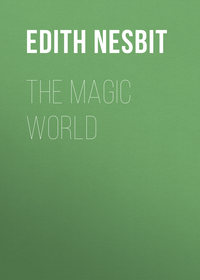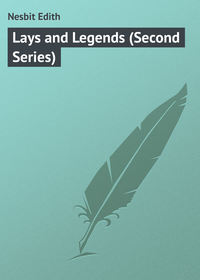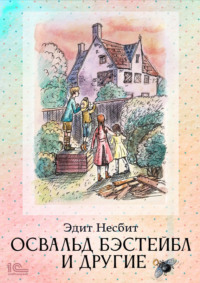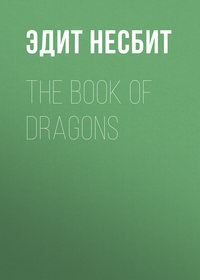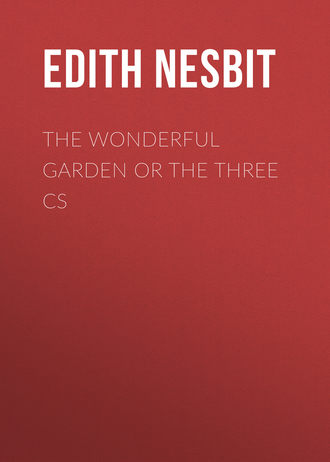 полная версия
полная версияThe Wonderful Garden or The Three Cs
A white faced house stood on the other side of the churchyard.
‘I suppose the clergyman lives there,’ said Caroline. ‘Please,’ she said to a pleasant-looking hook-nosed man who was mending the churchyard wall, and whistling ‘Blow away the morning dew’ as he slapped on the mortar and trimmed off the edges with a diamond-shaped trowel, ‘please, does the clergyman live in that house?’
‘He does,’ said the man with the trowel. ‘Do you want him?’
‘Yes, please,’ said Caroline.
‘Well, here he is,’ said the man with the trowel. ‘What can I do for you?’
‘Do you mean to say that you’re It?– the clergyman, I mean, – I beg your pardon,’ said Caroline; and the man with the trowel said, ‘At your service.’
‘I beg your pardon,’ said Caroline again, very red as to her ears. ‘I thought you were a working man.’
‘So I am, thank God,’ said the man with the trowel. ‘You see we haven’t much money to spare. The parish is so poor. So we do any little repairs ourselves. Did you ever set a stone? It’s awfully jolly. The mortar goes on so nicely, and squeezes out pleasantly. Like to try?’ he asked Charles.
Of course they all liked to try. And it was not till each had laid a stone and patted it into place, and scraped off the mortar, and got thoroughly dusty and dirty and comfortable, that any one remembered why they had come.
‘Oh, this?’ said the clergyman – for so I must call him, though anything less clergyman-like than he looked in his mortar-stained flannels and blue blazer you can’t imagine. ‘It looks interesting. Latin,’ he said, opening it carefully, for his hands were very dirty.
‘Yes,’ said Charles with modest pride. ‘I told them it was. I saw rara and quam and apud.’
‘Quite so,’ said the clergyman; ‘rara, quam, and apud. Words of Power.’
‘Oh, do you know about Words of Power?’
‘Rather! Do you?’
‘Rather!’ they said. And if anything had been needed to cement this new friendship well, there it was.
‘Look here,’ said the clergyman. ‘If you’ll just wait while I wash my hands I’ll walk up with you. And I’ll look through the book and report to you to-morrow.’
‘But what’s it about?’
‘About?’ said he, turning the leaves delicately with the least mortared of his fingers. ‘Oh, it’s about spells and charms and things.’
‘How perfectly too lovely,’ said Charlotte. ‘Oh, do read us one– just only one.’
‘Right O,’ was the response of this unusual clergyman, and he read: ‘“The seed of the fern if pulverised” – pounded – smashed, you know, – “and laid upon the eyes at the twelfth hour” – midnight, you know – at least I think that’s it – “last before the feast of St. John” – that’s to-morrow by the way – “shall give to the eyes thus doctored” – treated – dealt with, you know, – “the power to see that which is not to be seen.” It means you’ll see invisible things. I say I must wash. I feel the dirt soaking into my bones. Will you wait?’
The children looked at each other. Then Charlotte said:
‘Look here. Don’t think we don’t like you. We do – awfully. But if you walk up with us will you feel bound to tell uncle about the book? Because it’s a secret. He’s looking for a book, and we think perhaps this is it. But we don’t want to tell him till we’re quite sure.’
‘I found it inside Somebody-or-other-quite-dull on Thessalonians, you know,’ said Charles, ‘and I saw it was Latin because of quam and – ’
‘My dear sir – and ladies,’ said the agreeable clergyman, ‘I am the soul of honour. I would perish at the stake before I would reveal a centimetre of your least secret. Trust me to the death.’
And off he went.
‘What a different clergyman,’ said Charles; ‘he is just like anybody else – only nicer.’
‘He said thank God,’ Caroline reminded him; ‘he said it like being in church too, not like cabmen and people in the street.’
‘He said “Thank God he was a working man,”’ said Charlotte. ‘I wonder what he meant.’
‘I shall ask him some day,’ said Caroline, ‘when we know him better.’
But any one who had met the party as they went talking and laughing up the hill would have thought they had known each other for long enough, and could hardly know each other any better than they did.
Charles was dreaming of mortaring the Murdstone man securely into a first-class railway carriage, and tapping him on the head with a brass trowel which was also a candlestick, when he was awakened by a pinch given gently. At the same moment a hand was laid on his mouth, and a whisper said:
‘Hist! – not a word.’
‘Shut up,’ said Charles, recognising at once the voice of his sister Charlotte. ‘I’m asleep. Don’t be a duffer. Go to bed.’
‘No, but,’ said Charlotte in the dark, ‘Caroline and I have been talking about the fern-seed. And we’re going to try it – putting it on our eyes, I mean. To see whether we can see invisible things.’
‘Silly,’ said Charles briefly.
‘All right. Only don’t say we didn’t ask you to join in.’
‘There isn’t any fern-seed,’ objected Charles.
‘Yes, there is. Mrs. Wilmington’s got some in the room they call the housekeeper’s room. Under a bell-glass. Stupid little ferns; but I expect the seed’s all right. Caro saw them when she went in to ask the Wilmington if we might get up at seven instead of half-past because of everything being so new and lovely. She meant because of the charm-book, of course. And she saw the ferns then.’
‘Are you really going to?’ asked Charles, warm in bed.
‘Yes,’ said Charlotte in a take-it-or-leave-it tone.
‘Oh, very well,’ said Charles; ‘only don’t forget I told you it was silly rot. And of course nothing will happen. I was right about the Latin, you know.’
‘Here’s your dressing-gown,’ said Charlotte, who had been feeling for it in the mahogany wardrobe. ‘You can scrabble for your shoes with your feet; I suppose they’re beside the bed. Hurry up.’
Charles got up, grumbling gently. It was not to be expected that he would feel the same about this wild fern-seed idea as his sisters, who had thought and talked of nothing else for more than three hours, and had had to pinch each other to keep awake. Still, he got up, and they all went down to Mrs. Wilmington’s room, which was warm and seemed full of antimacassars, china ornaments, and cheerfully-bound copies of the poets – the kind that are given for birthday presents and prizes, beautiful outside, and inside very small print on thin paper that lets the printing on the other side show through. Charlotte found this out as they waited, by the light of their one candle, for it to be twelve o’clock.
Caroline was plucking fronds of fern, carefully, so that the lack of them should not disfigure the plants.
‘It’s all duffing,’ said Charles. ‘Don’t forget I said so. And how are you going to pound the beastly stuff? You’ll wake the Wilmington and the Uncle and the whole lot if you pound.’
‘I thought,’ said Caroline, hesitating with the fern-fronds in her hand, and her little short pig-tail sticking out like a saucepan handle, as Charles put it later, ‘I thought – it sounds rather nasty, but it isn’t really, you know, if you remember it’s all you– I thought we might chew them. Each do our own, you know, and put them on our eyes like a poultice. I know you hated it when Aunt Emmeline chewed the lily leaves and put them on your thumb when you burnt it,’ she told Charles, ‘but then her chewing is quite different from you doing it.’
‘I don’t care,’ said Charles; ‘it’s only a bit more of your nonsense. Give us the beastly seeds.’
‘They won’t come off the leaves,’ said Caroline. ‘We shall have to chew the lot.’
‘In for a penny, in for a sheep,’ said Charlotte cheerfully. ‘I mean we may as well be hanged for a pound as a lamb. I mean – ’
‘I know what you mean,’ Caroline interrupted. ‘Here you are. It’s just on twelve. Chew for all you’re worth, and when the Wilmington’s clock begins to strike put it on your eyes. And when it’s struck six of them take it off. Yes. I’ve thought about it all. I’m sure that’s right. Now, then, chew.’
‘I hope it’s not poison,’ said Charles; ‘you’ll remember I told you – ’
‘Of course it isn’t,’ said Caroline. ‘I’ve often licked ferns, and I’m not dead. I say – I daresay nothing will happen – but think how silly we should feel if we hadn’t tried it. And this is the only night. He said so.’
‘Oh, all right,’ said Charles. ‘At any rate, if we do it you can’t be always saying we ought to have.’
‘Chew,’ said Charlotte; and the clock began to strike.
‘One, two, three, four, five, six,’ said Mrs. Wilmington’s highly ornamented pink china clock; and each child thrust a little bunch of fern fronds into its mouth.
‘Seven,’ said the clock.
‘Now,’ said Caroline.
And each child… But you picture the scene.
‘Eight, nine, ten, eleven, twelve, purr,’ said the clock, and said no more.
‘I don’t like to take it off,’ said Charlotte, her hands to her eyes. ‘Suppose we did see something.’
‘We shan’t,’ said Charles.
‘You must,’ said Caroline.
‘Oh, well,’ said Charlotte, and took away the little poultice of chewed fern from each eye.
‘There’s nothing,’ she said.
‘I knew there wouldn’t be,’ said Charles. ‘Perhaps another time you’ll know I’m right.’
‘Never mind,’ said Caroline. ‘We did it. So we can’t keep bothering about what might have happened if we had. Let’s go to bed. It was decent of you to try, Charles, when you didn’t want to so much – Oh!’
‘What?’ said the others.
‘Poisoned,’ said Charles gloomily. ‘I knew it wasn’t safe. I expect you chewed harder than we did, and – Oh!’
Charlotte had already said her ‘Oh.’ And now all three children were staring straight before them at the window. And there, where a moment ago was just black bare outside night, was a face – a white face with wide dark eyes.
‘It’s true,’ gasped Caroline, ‘it is true – the fern-seed does – ’
‘It’s not true,’ said Charles stoutly, his eyes on the face.
‘Oh, but it is,’ said Charlotte. ‘Oh, what’s going to happen now?’
And each child felt that the fern-seed had done what no one had, in the deep heart, believed that it would do, and that their eyes now gazed – seeing – upon the unseen.
‘I wish we hadn’t,’ said Charles. ‘I told you not to.’
The lips of the face outside moved, as though it were speaking.
‘No,’ cried Charlotte. ‘I don’t want it to be true.’
A hand was raised – a hand outside the window. Would it knock at the window? The fern-seed only made you see the unseen, not hear the unheard. If the hand knocked at the window – and plainly it was going to knock, – if the hand knocked, would they hear it?
The hand knocked.
CHAPTER V
THE MIDNIGHT ADVENTURE
Now, the fern-seed was only warranted to show the invisible, not to make the unhearable heard. If there should be no sound when that raised hand tapped at the window, then the children would know that the fern-seed was doing what it was warranted to do by the Latin book. If, on the other hand, the hand tapped and made, in tapping, the usual noise produced by a common tapper, then one of two things might be true. Either the fern-seed was stronger than the Latin book bargained for, and was able to make people hear the unhearable even if they did not cover their ears with the charm that had covered their eyes, or else the fern-seed spell was all nonsense and the face outside the window was a real person’s face and the hand was a real person’s hand, and the tap that was coming on the window was a really-tap that would sound hard and rattly on the glass of the window, as taps sound when fingers of bone and flesh make them.
All the children felt quite sure that they were not at all sure whether they wanted the face to be the face of a real person, or whether they wished it to be the Invisible made visible by fern-seed. But when the hand tapped at the window and a sound came to the children within – a sound quite distinct, and just the noise you or I might make if we tapped at a window and didn’t want every one in the house to hear us – the children, though startled, no longer felt any doubt as to what they wished that face to be.
‘It’s only a real person,’ whispered Charles, and sighed deeply.
‘It’s only a boy,’ said Caroline. ‘What does he want?’
‘It’s that Rupert chap we saw in the train,’ said Charlotte.
Every one breathed much more freely, and they all smiled and nodded towards the window; and the face nodded back, but it did not smile.
‘He must have run away,’ said Charles, ‘like I told him to.’
‘It wasn’t you; it was me,’ said Charlotte promptly.
‘I like this much better than its being invisible people,’ said Charles, changing the subject a little. ‘This is something like an adventure.’
‘We shouldn’t have had it without coming down for the fern-seed,’ Caroline reminded him. And again they all nodded and smiled. The face outside moved its lips. It was saying something, but they could not hear what it said.
‘It is that Rupert boy,’ Caroline insisted; ‘and he’s run away to us. What larks!’
And again she nodded, and so did Charles. But Charlotte said, ‘Don’t let’s go on nodding like Chinese pagodas. Of course, it wants to come in.’ And at once the others saw that this was the case.
‘He can’t get in here,’ Charlotte said; and, indeed, to have moved that table on which the fern-filled bell-glass stood surrounded by unhappy-looking little ferns in little dry pots, with bits of old tumbler arched protectively over them, would have been dangerous, and probably noisy. And, unless they removed the ferny difficulties, it was quite plain that the window could not be opened.
‘The morning-room is next door – Mrs. Wilmington called it that,’ said Caroline. ‘It’s a French window. She said so. It opens all right. I know how the fastenings go.’
‘Why “French”?’ asked Charlotte, eager for information even at that exciting moment, while Caroline was trying to explain to the face by signs that if it would just go along till it came to a French window it would find some one ready to let it in. ‘Why “French”?’
‘Because it’s like a door,’ said Charles, joining in the sign-message. ‘Everything in France is the opposite of here. They say “we” for “yes,” and “two” is “you,” and “four” is an “oven.” Silly, I call it.’
‘Hush!’ whispered Caroline. ‘Tread softly, and don’t tumble over the wolf-skins.’
Candle-bearing, the little procession passed along to the morning-room. The face had understood the signs. At any rate, there it was, framed in glass panes; and when the French window, which was, indeed, just like a door, was opened, there was the face, as well as the hands, arms, legs, body, and feet, of Rupert, the platform boy, or somebody exactly like him.
‘Come in,’ said Caroline, holding the door open. And Charlotte added, ‘Fear nothing! We will baffle your pursuers. We are yours to the death.’
He came in, a drooping dusty figure, and the French window, which had permitted itself to be opened with the most gentle and noiseless submission, now, in closing, uttered what was little less than a tactless squawk.
‘Fly!’ whispered Caroline, swiftly turning the handle that fastened it. ‘But your boots will betray us.’
Flight was the only thing, you see, and they had to risk the boots. Yet Rupert in his flight was noiseless as the others, who were all bath-slippered, and therefore shod with – if you were only reasonably careful and looked where you were going – the shoes of silence.
When the whole party was safe in Charles’s room, with the door shut, they blew out the candles and stood holding each other and their breaths as they listened in the dark for what they fully expected to hear – the opening click of Mrs. Wilmington’s lock, the opening creak of Mrs. Wilmington’s door, the approaching rustle of Mrs. Wilmington’s gown, the mincing amazement of Mrs. Wilmington’s voice.
But all was still – still as the inside of a palm-house, which, as no doubt you know, is very much quieter than most of the few quiet places in this noisy world.
The four fugitives let their breaths go cautiously, and again held them. And still the silence wrapped them round, thick and unbroken as the darkness in which they stood.
‘It’s all right,’ whispered Caroline at last. ‘Light up.’
Fortunately, each silver candlestick had its box of safety-matches in a silver holder fastened to its handle by a silver chain. This does happen in really well-managed houses. The candles were lighted.
‘We are saved,’ said Charlotte dramatically.
‘You came up like a mouse,’ said Caroline to Rupert, – ‘a quiet mouse.’
It was then seen that Rupert’s boots were not on his feet, but in his hand, very muddy, and tied together by frayed boot-laces.
‘I took them off,’ he explained, ‘when I got into your park. My feet hurt so, and the grass was so soft and jolly. Oh, I am so tired – and hungry!’ His voice broke a little, and if he had not been a boy I think he would have cried.
‘Get on to the bed,’ said Charlotte, with eager friendliness, ‘and lie down. You be a wounded warrior and we’ll be an Arab oasis that you’ve come to. That’s the tent of the sheikh,’ she added, as Charles gave the weary Rupert a ‘leg up’ and landed him among the billows of the vast feather-bed. ‘Repose there, weary but honoured stranger. Though but humble Arabs, we are hospitable to strangers. We will go and slay a desert deer for you.’
‘There are lots of biscuits in the sideboard in the dining-room,’ said Caroline. ‘I’ll stay with the wounded – or else you can stay and I’ll go with whichever doesn’t.’
Though it was the middle of the night no one even thought of being sleepy. Perhaps it was the excitement of this most real adventure, or perhaps the seeds of the fern have an awakening effect. At any rate, the three C.’s were as ready to begin a new game as though it had been ten o’clock in the morning of the first day of the holidays, instead of half-past twelve of a night that wasn’t any night in particular except the Eve of St. John.
Charlotte and Charles set off, important and tip-toeing, on a biscuit-hunt, and Caroline, like a good little nurse, fetched a basin and sponge and washed the face of the stranger, taking no notice of his objections that he was not a baby, and earnestly hoping that in her long dressing-gown she looked at least a little like an Arab maiden ministering to a Feringhee warrior.
‘Now I’m going to wash your weary feet, if you will stick them out over the side of the bed,’ she said. ‘They always do in Saracen countries; and if you think it’s like a baby I’ll call it dressing your wounds.’
She brought a chair and a basin of water very carefully, and a big sponge, and then she peeled off Rupert’s stockings and bathed his tired, swollen feet with great care and gentleness. And if a little of the water did go on the bed – well, you can’t think of everything all in a minute, and she did put a towel under his legs afterwards.
‘That’s jolly,’ said the wounded knight, more graciously.
‘You are terribly wounded,’ said Caroline comfortingly. ‘You must have been fighting dragons or walking over red-hot ploughshares, or perhaps it was a pilgrimage with peas in your shoes. We play pilgrims sometimes, with cockles in our hats and pilgrims’ staffs – only we always pretend the peas. I think it’s quite fair to pretend the shoes, don’t you?’
When the others came back from their hunting, with a good ‘bag’ (it was a tin, really) of biscuits, the Saracen maiden greeted them with —
‘Hist! The stranger sleeps. Let’s pretend he’s fainted, and we’ll rouse him with a skin of wine. Get some water in the tooth-mug. And where are the biscuits?’
‘We might as well have turbans,’ said Charlotte, hastily twining a bath-towel round her head. ‘All really Arab maidens are turbaned Turks.’
‘Let’s make it more tent-like before we wake him,’ Charles suggested, drawing the curtains round two sides of the four-poster; ‘and we might put the candles out of sight and pretend they’re Arabian knights’ lanterns.’
‘Or put them in a line on the chest, and let them be the sun rising over the sands of the desert,’ said Charlotte, putting the three candlesticks in a row.
When all was arranged, the three towel-turbaned children climbed into the tent and looked at the wounded knight, who lay asleep, looking very tired indeed, his feet still wrapped in the towel and his head half fallen off the pillow.
‘Let him sleep a little longer,’ said Caroline, ‘ere we rouse him to eat of the flesh of the deer which my brothers have brought to the wigwam for the benefit of the poor pale-face.’
‘We’re not Indians, silly,’ said Charlotte. ‘We’re Arabs, and I could do with a bit of the flesh of the deer myself, if you come to that.’
‘So could I,’ said Charles, his turban over one eye. ‘It’s jolly not being asleep. They say you get sleepy and cross if they let you sit up – but look at us.’
‘Yes, look at us,’ the others agreed, and ate the best mixed biscuits in a contented silence, broken only by the sound of crunching.
The familiar sensation of biscuit in the mouth seemed somehow to calm the excitement of the three C.’s.
The adventures of the night, which had seemed, as they happened, not so very wonderful, now began to appear more surprising, and at the same time more real. And the silence which biscuit-eating demands (unless you are prepared to behave really badly and talk with your mouth full and have the crumbs all over the place) was favourable to reflection – a friend to thought.
‘Do you know,’ said Caroline at last – ‘pass the mug, please – do you know, I don’t at all know what we’re going to do with him.’
‘I was just thinking that,’ said Charlotte.
‘So was I,’ said Charles.
‘But I’ve been thinking – ’
‘So have I,’ said the other two together.
‘What?’ asked Caroline, stopping short.
‘What you have,’ said Charlotte, and Charles repeated her words.
‘Then I needn’t tell you what I thought,’ said Caroline briefly.
I think they were all getting, perhaps, a little sleepy – or the effect of the fern-seed was wearing off.
‘Oh, don’t be crabby,’ Charlotte said. ‘We only meant we didn’t see what on earth we could do with him. I suppose he must sleep with Charles. There’s lots of room.’ She leaned back on a pillowy bunch of featherbed and closed her eyes.
‘No, you don’t,’ said Caroline firmly, pulling her sister up again into a sitting position by a limp arm. ‘I could go to sleep myself if it comes to that. Take your turban off. It’ll cool your sleepiness.’
‘I said’ – Charlotte spoke very slowly and distinctly, as people do when they are so sleepy they aren’t quite sure whether they can speak at all – ‘I said, “Let him sleep with Charles.”’
‘Oh yes!’ said Caroline. ‘And be found in the morning when they call us, and taken alive and delivered back to the Murdstone man. No, we must hide him, and wake him before they call us. I can always wake up if I bang my head the right number of times on the pillow before I go to sleep.’
Charlotte was nodding happily.
‘Get up!’ said Caroline, exasperated. ‘Get up! Get down! Get off the bed and stand on your feet. Now, then, Charles!’
But Charles was deeply slumbering, with his mouth very much more open than it ought to have been.
‘That’s it!’ said Caroline, as Charlotte responded to her pull. ‘That’s it. It’s just you and me! Women always have to do the work of the world! Aunt Emmeline said so once. She said it’s not “Men must work and women must weep”; it’s “Men must talk and women must work.” Come on and give me a hand.’
‘All right. I’m awake now,’ said Charlotte cheerfully. ‘I’ve been biting my tongue all that awful time you’ve been talking. What’s the idea?’
‘We’ll make him an upper berth, like in ships,’ Caroline explained, ‘and then we’ll wake him up and water him and biscuit him and explain things, and get Charles into bed and all traces concealed. It’ll be just you and me that did it. That’s glory, you know.’
‘Oh, do stop talking,’ said Charlotte. ‘I’ll do anything you like, only stop talking.’
There was a great mahogany wardrobe in the room, with a mahogany hanging-cupboard at each side, and between the mahogany cupboards a space with mahogany drawers below and mahogany shelves above. And the shelves were like shallow drawers or deep trays, and you could pull them in and out. There was nothing on the shelves but clean white paper, and on each shelf a little bag made of white muslin and filled with dried lavender, which smelt very sweet through the fine mesh of the muslin.



